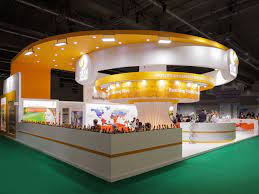In an era where environmental consciousness is on the rise, the events and exhibition industry is no exception to the call for sustainability. Exhibition companies are increasingly recognizing the importance of minimizing their ecological footprint and promoting sustainable practices in their events. In this article, we will explore how exhibition companies are embracing sustainability and implementing eco-friendly initiatives to reduce their environmental impact while delivering successful exhibitions.
1. Sustainable Booth Design
Exhibition companies are taking a lead in designing eco-friendly booths. They prioritize the use of sustainable materials like recycled wood, bamboo, or low-impact paints. Modular booth designs that can be reused at multiple events are becoming popular, reducing the need for single-use materials.
2. Energy Efficiency
Efficient energy use is a cornerstone of sustainable exhibitions. Exhibition companies are incorporating LED lighting, which consumes significantly less energy than traditional lighting. They also encourage clients to use energy-efficient appliances and offer smart solutions like motion-activated lighting to reduce electricity consumption during events.
3. Waste Reduction and Recycling
Exhibition companies are implementing waste reduction strategies to minimize the amount of waste generated during events. They promote recycling by providing clearly marked recycling bins throughout the exhibition space. Furthermore, they work closely with exhibitors to encourage responsible waste management practices.
4. Sustainable Transportation Options
To reduce the carbon footprint associated with transportation to and from exhibitions, companies are increasingly promoting sustainable transportation options. This includes providing information on public transportation, facilitating carpooling, and encouraging attendees to use eco-friendly modes of travel, such as bicycles.
5. Digital Marketing and Communication
Exhibition companies are reducing paper usage by embracing digital marketing and communication. Event invitations, brochures, and programs are often made available electronically, reducing the need for printed materials. Additionally, digital signage and mobile apps are replacing traditional paper signage.
6. Eco-Friendly Giveaways
Sustainable giveaways are gaining popularity at exhibitions. Exhibition companies encourage their clients to provide eco-friendly promotional items such as reusable tote bags, biodegradable pens, or items made from recycled materials. These items not only reduce waste but also convey a commitment to sustainability.
7. Water Conservation
Sustainable exhibitions focus on water conservation as well. This includes the use of low-flow faucets and water-saving fixtures in restroom facilities. Exhibition companies often partner with venues that have implemented water-saving measures.
8. Offset Carbon Emissions
Some exhibition companies are taking the extra step of calculating and offsetting the carbon emissions associated with their events. They invest in carbon offset projects like reforestation or renewable energy to balance out the emissions generated by the event.
9. Sustainable Food and Catering
Exhibition companies recognize the impact of food choices on sustainability. They work with caterers to offer locally sourced, organic, and sustainably produced food options. These choices not only reduce the carbon footprint but also support local communities.
10. Education and Awareness
Promoting sustainability isn't just about the physical aspects of an event; it's also about raising awareness. Exhibition companies often organize seminars, workshops, or panel discussions on sustainability topics, allowing attendees to learn about eco-friendly practices and their importance.
11. Partnering with Green Suppliers
Exhibition companies choose suppliers and vendors who share their commitment to sustainability. This includes selecting eco-conscious printing companies, audiovisual providers, and logistics partners who prioritize sustainable practices in their operations.
12. Green Certification
Some exhibition companies seek green certifications for their events. These certifications, such as LEED (Leadership in Energy and Environmental Design), indicate that the event has met specific sustainability criteria. Achieving such certifications demonstrates a commitment to eco-friendliness.
13. Post-Event Sustainability Reports
After an event, exhibition companies often compile sustainability reports detailing the environmental impact of the exhibition. These reports showcase the progress made in reducing waste, energy consumption, and carbon emissions. They also provide recommendations for further improvements.
14. Encouraging Sustainable Practices Among Exhibitors
Exhibition companies play a vital role in encouraging exhibitors to adopt sustainable practices. They provide guidelines and best practices to exhibitors, helping them reduce their environmental footprint. This collaborative effort ensures that sustainability extends beyond the exhibition company to all participants.
15. Community Engagement
Sustainability in exhibitions isn't limited to the event itself; it extends to the surrounding community. Exhibition companies often engage with local communities through outreach programs, supporting environmental initiatives, and promoting sustainable practices in the region.
Conclusion
Sustainability in exhibitions is no longer an afterthought but a fundamental principle driving the industry forward. Exhibition companies are taking active steps to reduce their environmental impact, from sustainable booth design to energy-efficient lighting, waste reduction, and community engagement. By embracing eco-friendly practices, these companies not only contribute to a greener planet but also demonstrate their commitment to responsible business practices. As sustainability continues to gain prominence in the events and exhibitions sector, it is clear that exhibition companies are playing a pivotal role in shaping a more eco-conscious future for the industry.





Comments